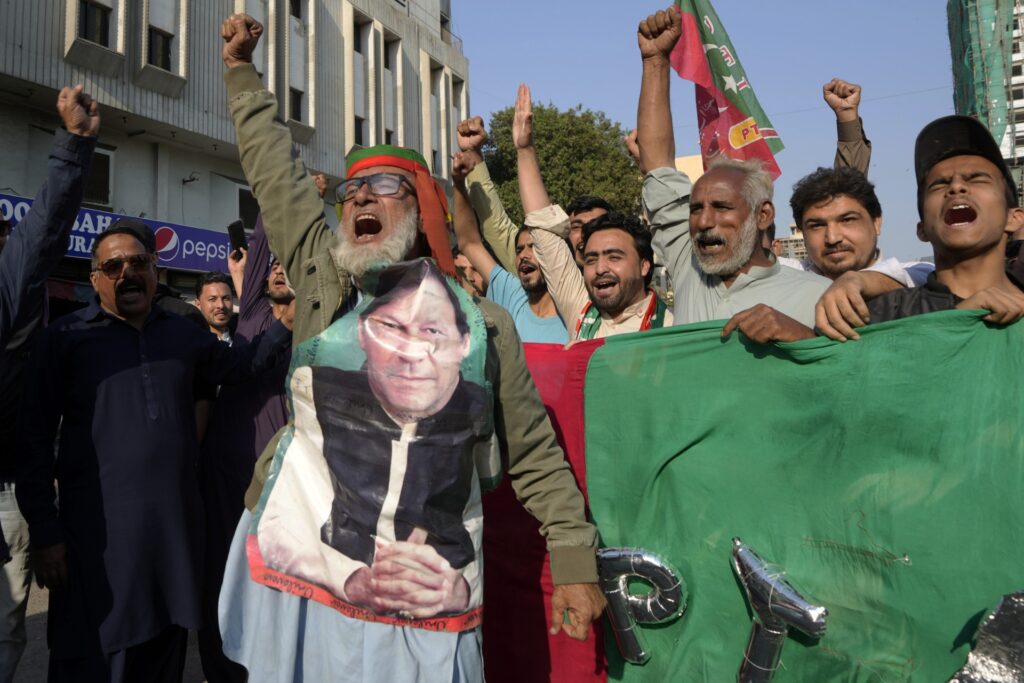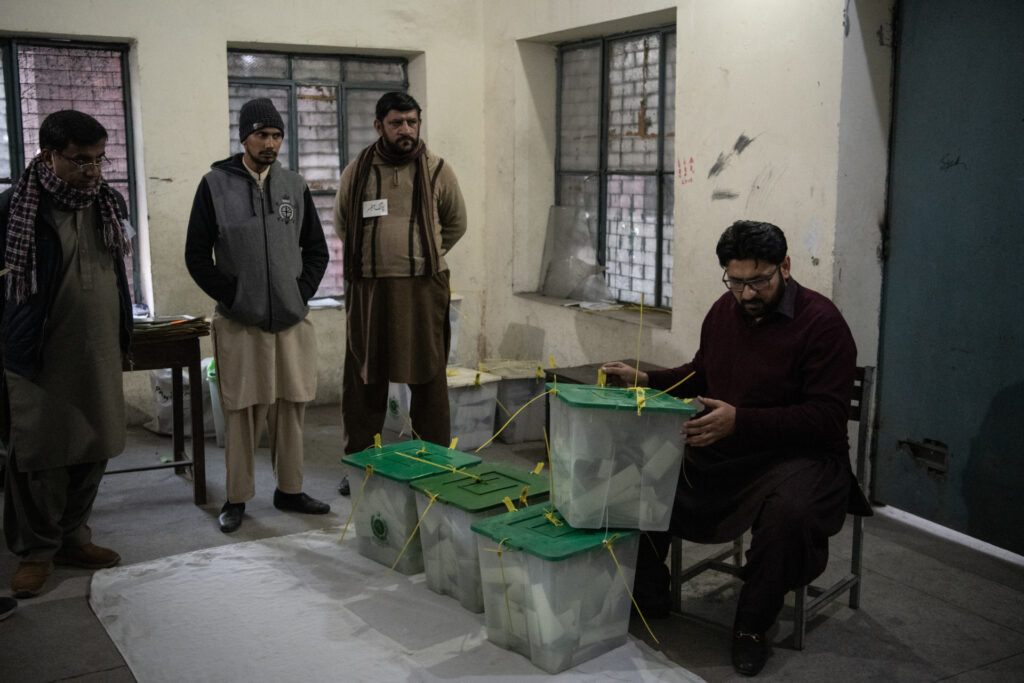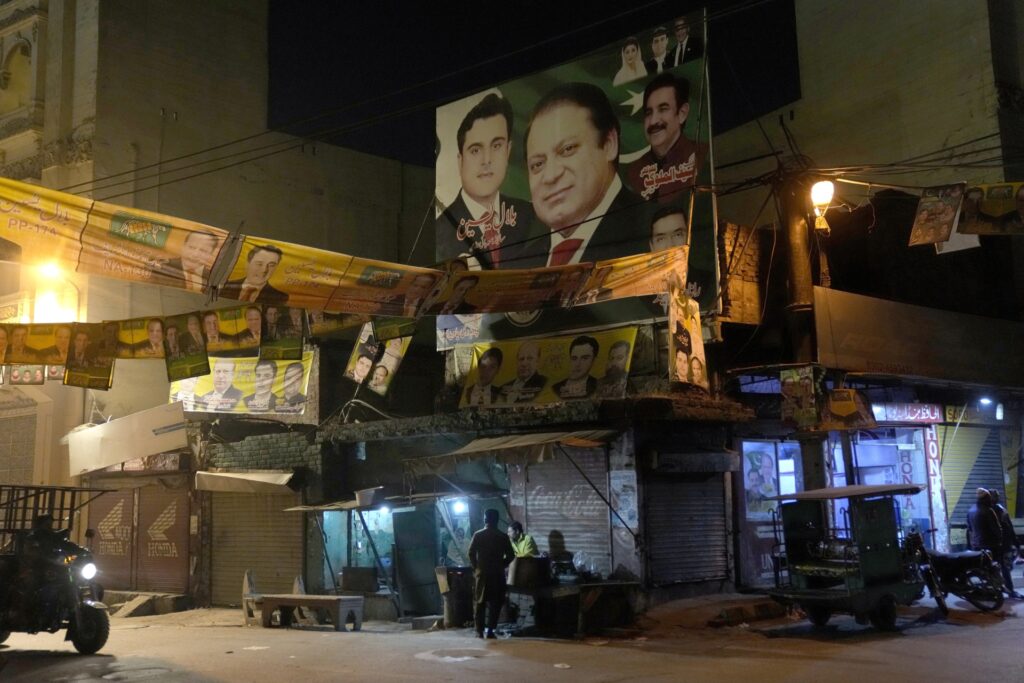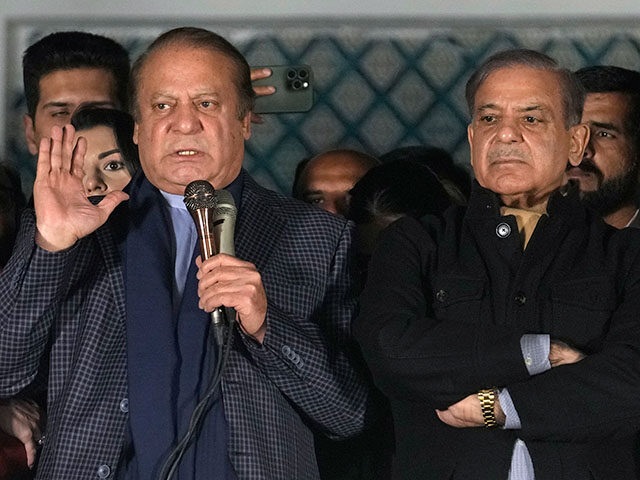As the dust settled from Pakistan’s highly contentious elections, presumptive prime ministerial candidate Nawaz Sharif stepped aside in favor of his younger brother Shehbaz, the former PM who is now likely to receive another term — even though the populist party of his predecessor Imran Khan won the most seats.
Khan has been sentenced to decades in prison on corruption and national security charges and his PTI party was erased from ballots by court order, but it still appears to have won the most seats in the chaotic election last week, a stunning victory considering the circumstances.

Supporters of Pakistan’s Former Prime Minister Imran Khan’s party ‘Pakistan Tehreek-e-Insaf’ chant slogans during a protest against alleged vote-rigging in some constituencies in the parliamentary elections, in Karachi, Pakistan, on February 11, 2024. (AP Photo/Fareed Khan)
The PTI did come up short of the seats needed to claim a majority and no other party is willing to form a coalition with it. PTI leaders have accused the powerful military establishment and government officials of rigging the election to prevent the party from winning the seats it needed.
One quirk of Pakistani election law that sank PTI’s chances was a requirement that 70 parliamentary seats must be reserved for female and non-Muslim candidates, and those seats cannot be held by independent candidates. PTI had to run its candidates as independents because a court order banned its well-known cricket bat symbol, chosen to honor Khan’s sporting career. The reserved seats will be divided between the other parties based on the proportion of non-reserved seats they won.
Sharif’s Pakistan Muslim League (PMLN) holds about 75 seats at last count, compared to 93 for PTI, but PMLN was able to put together a coalition of six other parties to get the majority vote needed, including the third-place Pakistan People’s Party (PPP).
PPP leader Asif Ali Zadari held a press conference on Tuesday in which he said negotiations were difficult and his party still has strong differences with PMLN, but they were able to set their difficulties aside for the good of the nation.

A Pakistani election worker prepares to unseal ballot boxes ahead of the start of the ballot count following the close of voting in Pakistan’s general election at a polling station on February 08, 2024, in Lahore, Pakistan. (Rebecca Conway/Getty Images)
Nawaz Sharif, 74, returned from political exile to win a seat in the national assembly in last week’s election. He previously served three non-consecutive terms as prime minister and was seen as the most likely choice by a ruling coalition to become the next PM.
On Wednesday, Sharif’s daughter Maryam said that her father has decided not to take the prime minister’s seat because he had majority governments during his three previous terms and does not relish the notion of presiding over a fractious minority government.
The job of herding Pakistan’s political cats will once again fall to Shehbaz Sharif, 72, who was prime minister before the government was dissolved to hold new elections. He is not wildly popular among voters – Khan inarguably has more popular support – but the political establishment gives him credit for holding the government together during the turmoil that followed Khan’s ouster by a parliamentary vote of no confidence in April 2022.

Election campaign poster of Pakistan’s former Prime Minister Nawaz Sharif’s party are displayed at a market in Lahore, Pakistan, on February 5, 2024. (AP Photo/K.M. Chaudary)
The younger Sharif also helped to secure a vital deal with the International Monetary Fund (IMF) last year, and he has the support of the Pakistani military, which has come to despise Imran Khan and his supporters.
Speaking from prison via social media, Khan expressed disdain for Sharif returning to the prime minister’s office with the sort of political coalition deal he regards as corruption. He repeated PTI’s allegation that the vote was rigged and insisted that PTI truly won the two-thirds majority needed to form a government on its own.
“I warn against the misadventure of forming a government with stolen votes,” Khan said. “Such daylight robbery will not only be a disrespect to the citizens, but will also push the country’s economy further into a downward spiral.”
“PTI will never compromise on people’s will, and I have categorically instructed my party against engaging with any political party that has robbed people’s mandate, including PPP, PMLN, and MQM,” he said.
MQM is the Muttahida Qaumi Movement, a socially liberal and secular party. Khan especially hates the MQM because it was once part of his political coalition, but it turned against him after he fell out of favor with the military.
“As the people of Pakistan have clearly pronounced their verdict, there is a dire need for democracy and fairness in Pakistan’s elections,” Khan concluded.

COMMENTS
Please let us know if you're having issues with commenting.